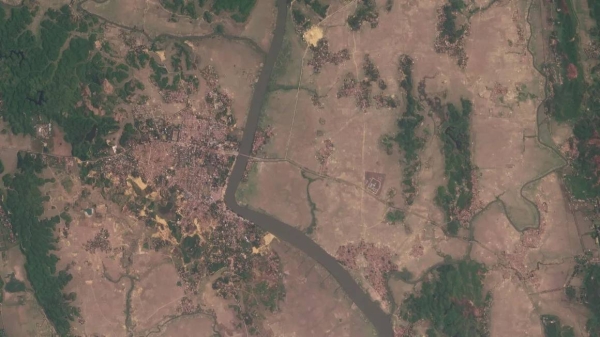There has been a recent surge in violence in Myanmar’s western state, leaving up to 200,000 Rohingya people displaced and their homes destroyed in arson attacks. The Rohingya community has long faced atrocities and forced displacement by the country’s military, which many believe constitutes genocide. Following a coup in February 2021, the military has been engaged in a civil war against ethnic armed groups, including the Arakan Army, leading to increased violence against the Rohingya.
The Arakan Army reportedly seized control of a predominantly Rohingya town near the Bangladesh border, setting fire to homes and preventing residents from returning. A telecom blackout in the area has made it difficult for families to communicate with their loved ones, exacerbating the crisis. Rohingya rights activists have reported that around 200,000 people have been forced to flee, with many left without food, shelter, or basic necessities.
Satellite imagery shows extensive destruction in the town of Buthidaung, with reports of arson attacks and airstrikes by both the Arakan Army and the Myanmar military. The situation has raised concerns of a potential genocide, prompting calls for intervention by the UN Human Rights Council. The young Rohingya men are facing forcible conscription by various armed groups, further escalating the violence and instability in the region.
The Arakan Army has denied allegations of torching homes and claims that the Myanmar military and allied Rohingya militant groups are responsible for the attacks. However, Rohingya refugees and activists have disputed these claims, stating that the AA has been targeting Rohingya villages. The lack of independent verification has hindered efforts to ascertain the truth behind the violence unfolding in the region.
The international community has expressed alarm over the escalating violence and humanitarian crisis in Rakhine state. Calls for a ceasefire, protection of civilians, and access to humanitarian aid have been made to prevent further atrocities. The US State Department has condemned the violence, highlighting the risks faced by civilians, particularly the Rohingya community. Meanwhile, Myanmar’s National Unity Government has pledged to address past atrocities and ensure they are not repeated in the future.
As the conflict in Myanmar intensifies, the plight of the Rohingya people remains precarious, with widespread displacement, destruction, and ongoing human rights violations. The international community must urgently intervene to protect the Rohingya and provide essential aid to those affected by the violence in Rakhine state. The situation demands immediate action to prevent further atrocities and ensure the safety and well-being of all affected populations.











